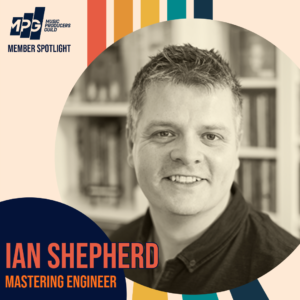 How would you define your main role on most of the projects you work on at the moment?
How would you define your main role on most of the projects you work on at the moment?
I’m a mastering engineer, and have been my whole career. Recently though I’ve also developed mastering plugins with MeterPlugs, and the Loudness Penalty website. I also run The Mastering Show podcast and Production Advice website & YouTube channel. Mastering is the common thread for all of these, though.
Please tell us a bit about your musical background. How did you get started in the music industry? What was your pathway to your current role?
I was trained as a mastering engineer straight out of college, which was quite unusual back then. I didn’t even know what mastering was, I just wrote to loads of studios asking for work, and got lucky! I worked at SRT for 15 years and got experience recording and mixing as well as mastering, plus helping set up Enhanced CD, DVD authoring and surround mixing & mastering services there. I feel really lucky to have had colleagues and mentors there helping me when when I started out. I set up Mastering Media in 2010 and things have developed from there.
What or who inspired you to follow this path?
I’d always been obsessed with audio, ever since hearing a starship fly over the top of my head listening to The Hitch Hiker’s Guide on headphones! I studied Physics & Music at college and knew I didn’t want to be a pro scientist or musician, but then realised I could work in the music industry and use skills from both.
Are there any highlights from your work that you are particularly proud of?
There are loads, but I have a soft spot for the smaller indie productions – I recorded, mixed and mastered a series of albums for Christine Tobin and Phil Robson that I’m still really proud of, for example. Outside of client work Bob Ludwig invited me to speak with him at AES New York because of Dynamic Range Day and my work on the plugins, which was a real honour.
What’s one tip you can share with other MPG members that could help their workflow?
Learn how to loudness-match, and do it often! It’s the single best way to hear really subtle differences accurately and objectively, and avoid being fooled. I always test new plugins with Perception AB for example. And more generally, understanding how LUFS work and the influence of loudness normalisation, especially for online streaming services, is really important and helpful. Most people are hearing everything with matched loudness online, so our stuff needs to sound great in comparison to everything else at the original loudness AND at -14 LUFS or whatever.
What’s one tip you would like an MPG member to share with you?
How to add more hours to the day?! Seriously though, I’m always curious about what people are finding the most effective ways to connect with potential new clients, both online and in the real world.
Do you have any words of wisdom for people wanting to get into a similar music production role to yours?
Monitoring is the single most important thing in mastering. You can’t make good judgements unless you’re hearing things accurately, so your speakers, room and acoustic treatment are crucial. Luckily these days you don’t have to spend a fortune to get great results, though!
Read more MPG Full Member Spotlight interviews